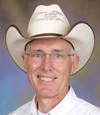By Bob Allen
A Texas Baptist pastor urged his congregation to shine a light on sexual abuse, which he says occurs much more frequently than most people believe, even in churches.
 Gary Morgan, pastor of Cowboy Church of Ellis County in Waxahachie, Texas, said in a recent sermon that sexual abuse carries damage beyond the physical and emotional.
Gary Morgan, pastor of Cowboy Church of Ellis County in Waxahachie, Texas, said in a recent sermon that sexual abuse carries damage beyond the physical and emotional.
“It makes a hole in the soul that can’t be fixed, and I didn’t understand this until just lately,” he said. “Over the last couple of months, maybe the last three or four months, we have just had a run on people who have been either sexually abused or raped, all kind of things like that, and it’s been an eye-opener to me.”
Morgan said in his July 29 sermon that statistics say that one out of every three girls is abused at some point in her lifetime. “Based on my experience, I think for this church, that’s a very optimistic figure,” he said. “I think the numbers are quite a bit higher among us.”
Morgan said sexual abuse is spiritually harmful to victims, who often feel they must have done something to bring on the abuse or allow it to continue.
“Because they feel somehow responsible on their part, what it does is it alters fundamentally their relationship with God,” he said. “Because they feel so stained and soiled and dirty and guilty and shameful, they believe they must also look that way to God.”
Morgan addressed three separate groups of people – victims, perpetrators and bystanders – with targeted advice of what to do about sexual abuse.
“Whenever and however you were abused, it was not your fault,” he told victims. “Period. End of paragraph.”
“Sexual abuse is always the fault of the one who is in authority, or the one who is in charge, or the one who is being trusted, or the one who is stronger, or the one who is in power,” he said. “It is never the fault of the victim.”
A second step toward healing, Morgan said, is for victims to find a way to forgive. “If you hold the unforgiveness in, it continues to eat on you,” he said. “You’re the one that’s being destroyed. It’s vital that you find a way to find forgiveness.”
When it comes to sexual abuse, the pastor said, forgiving does not mean forgetting. “Not only must you forgive, but you must turn the light on,” he said.
“That means you need to disclose to someone,” Morgan counseled. “You need to find someone you can trust: a physician, a counselor, a pastor. Be careful though.”
“What you need to know about turning the light on is it is going to be hell on earth,” Morgan said. “When you decide to turn the light on and say, ‘Grandpa abused me,’ get ready. It is going to be almost as bad, it may even feel worse to you, than the initial abuse did, because you’re going to be so shocked.”
Morgan said some victims find families who are very compassionate, but it is more common for them to “discover all the family support they thought they had is gone.”
“Nobody wants Grandpa outed, because it makes them look bad,” he said. “It makes the whole family look bad. They will threaten you. They will accuse you. They will say, ‘What are you doing, tearing our family apart?’ They will do everything they can to keep you from disclosing.”
“Here is what you need to know victims,” he said. “You are not now, nor will you ever be, responsible for the damage that spills into the family as a result of your disclosure, because the family was damaged or destroyed back when the abuse happened.”
Without disclosure, Morgan said, there really is no hope for healing. Just as important, he said, by disclosing abuse, “You prevent that abuser from abusing another grandchild, niece, nephew, or whoever it is.”
Morgan, who advised parents of small children to take them to another room before the beginning of his 45-minute sermon, said he chose to address such a dark topic because of the church’s silence on the problem of abuse of women and children.
“There are so many people living in desperation and isolation, looking at the church being silent, and hearing that silence as even coming from God himself,” he said. “It’s time that they at least have an acknowledgment that what has happened to them has been soul-altering and life-changing.”
Morgan gave similar advice to any in the congregation guilty of abuse – find a professional and report it – as frightening as it may be. “I don’t know what will happen to me. I could go to prison. Anything could happen,” he said, anticipating their thoughts. “That’s true, but you lost control of your life when you decided to abuse, and you will never get control of it back.”
To bystanders, Morgan said, “To know something is going on like sexual abuse and to do nothing is to become an accomplice to the crime.”
Morgan said family members who know about, or suspect, abuse are tempted to “leave it alone” because of ramifications for their family. But if they do they “will be remembered for what you did not do” when the accusations eventually come to light.
“If you are the one to turn it on, there is at least hope for healing of you,” he said. “There is hope for the victim. Otherwise, there is only going to be darkness.”
